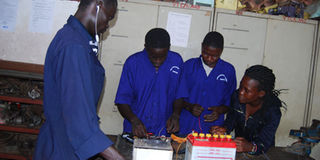Prime
Retraining graduates: Are govt bodies reinventing the wheel?

Students learn auto-mechanical repair at Lugogo Vocational Institute in Kampala recently. Such institutions of higher learning are worried that government parastatals who retrain their graduates may end duplicate their courses. Photo by Gillian Nantume
What you need to know:
- Heads of government parastatals say most graduates, despite good grades, join their companies and fail to perform neccesitating retraining which universities say is duplicating their courses.
Universities are currently drenched in fear over training schools that are being established by government parastatals. They claim that the schools are duplicating some of the courses they teach at the university.
For now, the National water and Sewerage Corporation (NWSC) has already opened up Ggaba Vocational Skills Development Institute to equip their technicians with skills.
While addressing participants at an engineering conference organised at Makerere University recently, NWSC training manager, Dr Martin Kalibbala, noted that majority of university graduates do not have basic skills despite the good grades they present.
“Few organisations are willing to pay for theory. Many of us want results. That is why the brightest of your students are not necessarily the most successful,” Dr Kalibbala said in his presentation.
Daily Monitor has also established that the Uganda Electricity Generation Company Ltd (UEGCL) is also in its final stages of starting up a training school, according to UEGCL senior engineer, Musa Mukula.
However, the establishment of the training schools by government parastatals has already attracted criticism from some university lecturers who argue that the system will see many courses being duplicated.
Govt must supervise
Geoffrey Ssentongo, a lecturer at Kyambogo University department of Civil Engineering, notes that if government does not supervise such training schools, they might end up coming up with more courses which might duplicate the ones taught at universities.
“Are they supervised by government to ascertain what they actually do? Government should come up with guidelines on how such training schools should operate otherwise there could be a clash where some courses may end up being duplicated to render universities irrelevant,” he says.
Every year, universities in Uganda produce thousands of graduates to compete for the few available jobs in the labour market.
However, a few of them tend to succeed in getting jobs as majorities are left out because they do not meet the required skills to do a particular job.
This trend has created a very big debate, with majority of people accusing higher institutions of learning of producing half-baked students.
Makerere University director of Quality Assurance, Dr Vincent Ssembatya, says parastatals only train their employees to acquire a specific skill unlike universities which he says teach to broaden the mind of the learners.
“You might find that the employer wants to shape their employees into a particular direction,” he says.
Dr Ssembatya adds that many organisations train their employees but says this cannot be a competition to the university curriculum where learners are trained on particular areas and not just specific skills. “It is expected that that way graduates are given more skills that will enable them perform better. There is no way this can affect the university curriculum because we look at broadening the students’ knowledge,” he says.
Competitive job market
Not only are university lecturers worried but heads of vocational institutions who claim their graduates might fail to get employment. Government already facilitates more than 50 technical and vocational training institutions in the country.
But the Education ministry undersecretary, Aggrey Kibenge, says universities have no reason to worry. He says training institutions only ensure their products are field-oriented because some of the graduates they get, perhaps lack particular skills to make them productive to the organisation.
“I need to crosscheck and gather more information on the same but from a policy angle, the ministry has been reviewing policies such as Skilling Uganda programme to ensure that training institutions are responsive to the labour market,” he says.
Kibenge adds that they have since initiated the Sector Skills Councils where they are engaging stakeholders in certain sectors who come together with curriculum designers to come up with skills that can enable graduates get jobs.
High unemployment levels
A recent study by Action Aid Uganda titled: “Lost opportunity? Gaps in youth policy and programming in Uganda,” put youth unemployment at 62 per cent, although the African Development Bank says it could be as high as 83 per cent.
It is estimated that more than 40,000 young people graduate from Ugandan universities each year. Yet the market can provide only 8,000 jobs annually.



